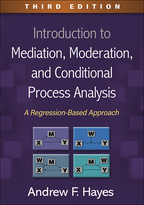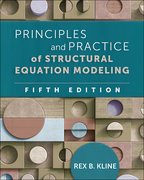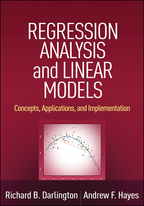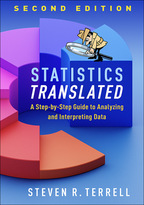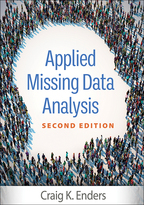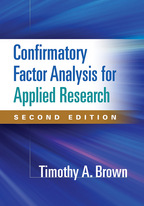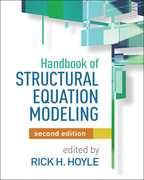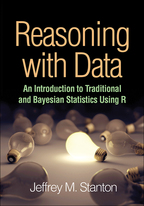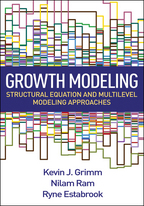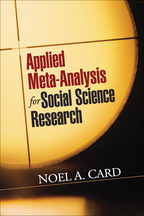Data Analysis for Experimental Design
Richard Gonzalez
Hardcover
Hardcover
orderSeptember 4, 2008
ISBN 9781606230176
Price: $92.00 439 Pages
Size: 7" x 10"
“It is a foundational book that all researchers (or future researchers) should have in their library.”

—Doody's Review Service
“This book is up to date, clearly written, and has a well-crafted array of study questions and exercises at the end of each chapter that will benefit both instructors and students. The strong links to modern statistical software will be appreciated, as will the patient explanations regarding what one is really doing when analyzing data—and why.”

—John R. Nesselroade, PhD, Hugh Scott Hamilton Professor of Psychology, University of Virginia
“Data Analysis for Experimental Design goes beyond the standard factual presentation to offer insights on strategy and interpretation. Detailed and engaging, the book builds logically from a small set of principles involving design, sampling, distributions, and inference to offer a thorough treatment of tests of hypotheses involving means. The author uses clever and incisive examples to illustrate fundamental aspects of research design and strategy. Relatively little prior training in statistical methods is assumed, making this an excellent text for a first course in applied statistical methods for graduate students.”

—Rick H. Hoyle, PhD, Department of Psychology and Neuroscience, Duke University
“The book provides graduate students and behavioral science researchers with a thorough introduction to experimental design, with an emphasis on developing a simple and intuitive understanding of the basic concepts of analysis of variance. The strength of this book lies in the clear exposition of complex statistical ideas and the comprehensive coverage of the subject area. The book is also noteworthy for its special attention to proper interpretations of hypothesis-testing results, confidence interval, and effect size, as well as for its explicit treatment of technical assumptions underlying statistical tests. This excellent text is highly recommended.”

—Jay Myung, PhD, Department of Psychology, Ohio State University
“The discussion of simple ANOVA concepts leads delightfully into more elaborate or general models. One of the very real strengths of this text is its treatment of multiple-comparison methods. There is a wonderful discussion of planned and unplanned contrasts and their use with or without preceding omnibus significance tests. The discussion of orthogonal contrasts and orthogonal polynomials is another strength.”

—Warren E. Lacefield, PhD, Department of Educational Leadership, Research, and Technology, Western Michigan University
“The arrangement of topics, flow of discussion, conversational language, and general coverage make this a highly readable and informative textbook. Students and instructors will especially appreciate the author's 'storytelling' approach, which is interesting and relevant as well as conceptually rigorous.”

—Warren E. Lacefield, PhD, Department of Educational Leadership, Research, and Technology, Western Michigan University
“I could see using this book in an upper-level experimental methods course for undergraduates, or in a first course for graduate students in psychology, assuming they have all had introductory statistics.”

—Michael Milburn, PhD, Department of Psychology, University of Massachusetts-Boston
—Doody's Review Service
“This book is up to date, clearly written, and has a well-crafted array of study questions and exercises at the end of each chapter that will benefit both instructors and students. The strong links to modern statistical software will be appreciated, as will the patient explanations regarding what one is really doing when analyzing data—and why.”
—John R. Nesselroade, PhD, Hugh Scott Hamilton Professor of Psychology, University of Virginia
“Data Analysis for Experimental Design goes beyond the standard factual presentation to offer insights on strategy and interpretation. Detailed and engaging, the book builds logically from a small set of principles involving design, sampling, distributions, and inference to offer a thorough treatment of tests of hypotheses involving means. The author uses clever and incisive examples to illustrate fundamental aspects of research design and strategy. Relatively little prior training in statistical methods is assumed, making this an excellent text for a first course in applied statistical methods for graduate students.”
—Rick H. Hoyle, PhD, Department of Psychology and Neuroscience, Duke University
“The book provides graduate students and behavioral science researchers with a thorough introduction to experimental design, with an emphasis on developing a simple and intuitive understanding of the basic concepts of analysis of variance. The strength of this book lies in the clear exposition of complex statistical ideas and the comprehensive coverage of the subject area. The book is also noteworthy for its special attention to proper interpretations of hypothesis-testing results, confidence interval, and effect size, as well as for its explicit treatment of technical assumptions underlying statistical tests. This excellent text is highly recommended.”
—Jay Myung, PhD, Department of Psychology, Ohio State University
“The discussion of simple ANOVA concepts leads delightfully into more elaborate or general models. One of the very real strengths of this text is its treatment of multiple-comparison methods. There is a wonderful discussion of planned and unplanned contrasts and their use with or without preceding omnibus significance tests. The discussion of orthogonal contrasts and orthogonal polynomials is another strength.”
—Warren E. Lacefield, PhD, Department of Educational Leadership, Research, and Technology, Western Michigan University
“The arrangement of topics, flow of discussion, conversational language, and general coverage make this a highly readable and informative textbook. Students and instructors will especially appreciate the author's 'storytelling' approach, which is interesting and relevant as well as conceptually rigorous.”
—Warren E. Lacefield, PhD, Department of Educational Leadership, Research, and Technology, Western Michigan University
“I could see using this book in an upper-level experimental methods course for undergraduates, or in a first course for graduate students in psychology, assuming they have all had introductory statistics.”
—Michael Milburn, PhD, Department of Psychology, University of Massachusetts-Boston


